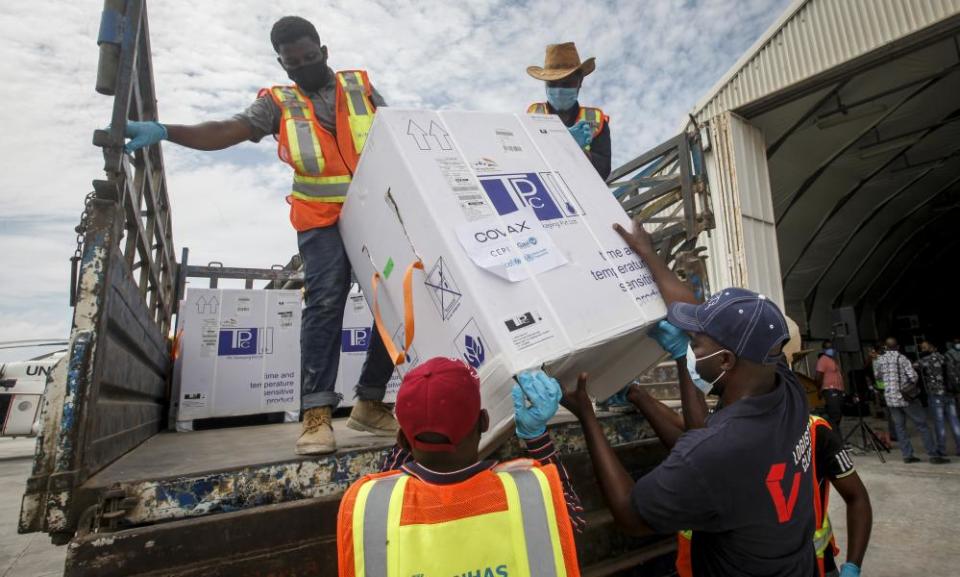Despite the grand words, this G7 falls devastatingly short on vaccines

The history of international summits is a tale of missed opportunities. When the US and Europe met in Evian in 1938, with the evidence of Nazi antisemitism stunningly clear and the risk of a looming holocaust all too real, they turned their backs on the truth.
In 1990, as the cold war ended, Germany focused on German unification, France on European unification and the US on holding Nato together – and summit after summit lost sight of the even bigger prize, to unite the world by integrating Russia into the international community.
The financial crisis of 2009 was the opportunity to do more than prevent a recession becoming a depression; but the failure to rebuild the broken international architecture of economic decision-making led directly to the protectionism of “America first”, “China first”, “India first” and “Russia first”.
Now the 2021 G7 will go down in history as another turning point where history failed to turn. Long after this weekend summit is over and the handshakes, photocalls and communiques fade from memory, it will be remembered only for failing to honour Boris Johnson’s pre-summit promise to vaccinate the entire world: an unforgivable moral lapse when every three months Covid-19 is destroying 1 million lives.
At least 11bn vaccine doses are needed to guarantee all countries the same levels of anti-Covid protection as the west. Without that worldwide coverage, the disease will continue to spread, mutate and return to threaten even the vaccinated. It is an undeniable fact that all of us will live in fear until no one lives in fear. So providing the vaccines is not just an act of charity: it is a form of self-protection, perhaps the best insurance policy in the world.
But less than 1% of sub-Saharan Africa has been fully vaccinated. With a population of 1.3 billion, Africa as a whole has received just 41m of the 2.5bn ordered doses. On current trends, says Unicef, it could be 2024 before western levels of vaccination are reached, if at all.
The gift of 1bn doses from the richest countries to the poorest is headline-grabbing and welcome. But it falls billions of doses short of a solution and does not answer what Johnson called “the greatest challenge of the postwar era”. We need to do for the world what Britain has done for itself: to construct a virtuous circle, starting with guaranteed G7 funding that underwrites the pooled purchasing of vaccines, which in turn generates new manufacturing capacity on every continent.
In front of the leaders was a comprehensive delivery plan prepared by ACT-Accelerator – the respected health coalition – to deliver vaccines through Covax, and a burden-sharing formula, proposed by Norway and South Africa, under which G7 attendees would pay two-thirds of the cost
G7 leaders were informed that only half the $33bn (£23bn) urgently needed for vaccines testing and protective equipment this year has been raised, with at least the same again needed for 2022. Yet, instead of the G7 paying their share, they offered up about $7bn worth of vaccines.
Related: Drop Covid vaccine patent rules to save lives in poorest countries, UK and Germany told
Nor did they solve the immediate emergency. To vaccinate only their most vulnerable 10%, Africa needs 225m doses now. African cases rose by 25% last week, but Britain was able to offer only 5m shots by the end of September, 2% of the required doses, and, with most of the US vaccines arriving later, millions of health workers will remain unprotected even as they risk their lives to save lives.
No progress was made either on the demand from 100 poorer countries for the temporary patent waiver that would transfer vaccine technology to them. Just as the G7 left unfilled an embarrassing pre-Cop26 hole in climate funds, it stopped short of another big decision: to use $100bn of new international money – so-called special drawing rights from the International Monetary Fund’s reserves – to help low-income countries . Campaigners will now demand that October’s G20 step up where June’s G7 fell short, but if the world’s richest countries sitting round the same table cannot offer more, it is difficult to see how Jonson’s promise to deliver “the single greatest feat in medical history” will be met. It was said of early 20th-century British political leaders that they never missed a chance to let slip an opportunity. As the global death toll mounts – towards 4 million and beyond – history will judge today’s leaders much more harshly.
Gordon Brown is a former prime minister and author of Seven Ways to Change the World

 Yahoo Movies
Yahoo Movies 